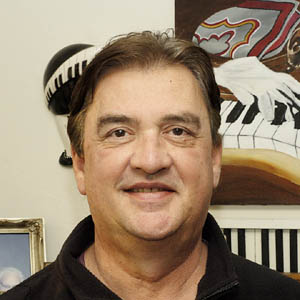![[Metroactive Features]](/features/gifs/feat468.gif)
[ Features Index | Silicon Valley | Metroactive Home | Archives ]
Howard Frederic.
Notes From the Underbelly
Dances With Pianos
ON A SUMMER DAY many years ago, Howard Frederic (pictured above) and his brother crawled into the family upright piano and stuck tacks onto the striking points of the hammers to achieve a "honky-tonky" effect. Thus began a musical career that has lasted more than 40 years. Howard writes and plays music in the band Black Pearl and is a member in good standing of the hallowed Piano Technicians Guild (PTG). There are non-PTG piano tuners, of course; one doesn't have to be in a guild to tune a piano. But using a non-PTG piano tuner is clearly pig-in-a-poke territory.
Howard has been hammering keys in the Bay Area his entire adult life: "Places I've worked as a musician include the Fairmont Hotel in San Francisco, the Claremont Hotel in Berkeley, Los Gatos Lodge, Bay 101 Club, Villa Felice, the Red Coach and many others. As a young man--still underage--I played various clubs in North Beach, some topless, with different bands. Fun gigs for a young man." The Bay 101 Club gig ended when San Jose Mayor Gonzales and his apparatchiks banned dancing and music (on a poopy technicality). This evil affected me personally, as I was a fan of Black Pearl (Howard and the incomparable Liz Lake) and enjoyed many a night of music and ballroom dancing. Now that tax dollars are rarer than truffles, one doesn't hear too much grousing about the evils of card rooms. Hosannas to Bay 101 for the tax dollars delivered unto San Jose.
The piano is a remarkably complex organism. Eighty-eight keys, more than 200 strings and 10,000 moving parts. A harmony of strings is a difficult thing to achieve, and is why a man such as Howard is required--to unravel the mystery and effect the repairs. "Working on pianos is a never-ending learning process. That's part of its charm," Howard told me. Spoken like a true trouble-shooter. A constant trouble, when it comes to pianos, is the wooden sounding board--the main acoustical structure of a piano. Changes in humidity or temperature cause the sounding board to expand or retract, affecting the tautness of the strings and, as a consequence, pitch.
Expansion and contraction over time never quite equal out, and the strings must be adjusted to regain correct pitch. Howard describes the process: "Tuning time is variable depending on the age and shape of a piano. Customers who have never had or seen a piano tuned are surprised how long it can take. An hour and a half to two hours is about average if the piano is in fairly good condition and hasn't been neglected. If it needs a pitch raise or some repairs, then of course it takes longer."
Piano sounding boards are often made out of Sitka spruce. Of note: Sitka spruce is used in the aerospace industry, such as nose fairings used on Trident missiles--yes, wooden missiles. Oddly, the innermost sarcophagus of King Tut's tomb is made of Sitka spruce. A common denominator for piano, ballistic missiles and dead pharaohs.
The Academy Award-winning documentary From Mao to Mozart depicts Isaac Stern's tour of China in 1979 and includes a splendid scene of Stern and his piano accompanist faced with employing a piano so out of tune it is virtually unplayable--and untunable. The potential disaster is resolved by having the only other playable piano in the city of Shanghai trucked to the auditorium. Lesson learned: a piano left untuned too long may be rendered impotent. Many piano manufacturers' warranties stipulate that their piano be tuned at regular intervals, or the warranty will be voided. Three to four tunes the first year--as the wood and strings settle in--and twice a year afterward. From Mao to Mozart (on DVD) features spectacular music from Stern and is filled with stirring video of the Chinese landscape, cityscape and Chinese people. This documentary didn't win the Academy Award for nothing. Top-drawer.
Final Note: If anyone in Sunnyvale (or environs) encounters a green and red Alexandrian parakeet, please call Yung Doan at 408.737.6100. The bird pulled off a daring escape and is sorely missed.
[ Silicon Valley | Metroactive Home | Archives ]
Copyright © Metro Publishing Inc. Metroactive is affiliated with the Boulevards Network.
For more information about the San Jose/Silicon Valley area, visit sanjose.com.
![]()

Photograph by Eric "ug" Carlson
"It's a pity to shoot the pianist when the piano is out of tune."
Rene Coty
Send a letter to the editor about this story to letters@metronews.com.
From the January 1-7, 2004 issue of Metro, Silicon Valley's Weekly Newspaper.